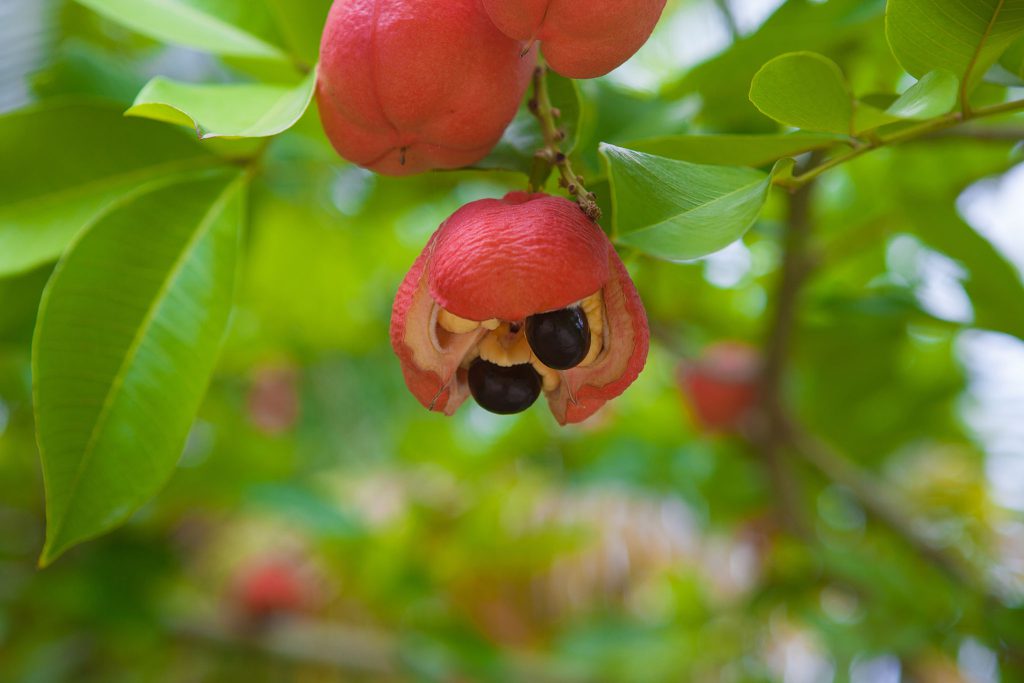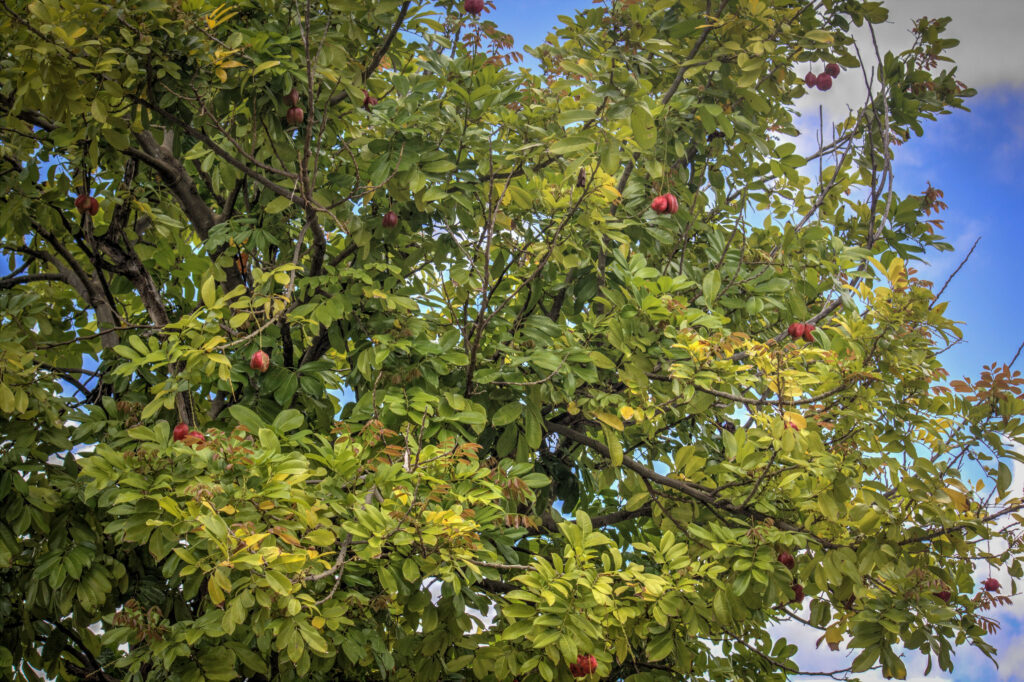Ackee Tree
Scientific name: Blighia sapida
Common names: Ackee, Achee, Akee
The Ackee tree, scientifically known as Blighia sapida, is not native to the US Virgin Islands but originates from tropical West Africa. Belonging to the soapberry family (Sapindaceae), this tree is extensively cultivated in tropical and subtropical regions for its edible fruit. The tree’s scientific name pays tribute to Captain William Bligh, who transported the fruit from Jamaica to the Royal Botanic Gardens in Kew, England, in 1793. The English common name “Ackee” is derived from the West African Akan term “akye fufo.” It is believed that the Ackee tree was introduced to St. Croix during Danish rule.

While the ackee fruit is primarily known for its culinary uses, various parts of the Ackee tree (Blighia sapida) have been used in traditional medicine in some regions. The bark, leaves, and seeds of the tree have been used in herbal remedies for various purposes. However, scientific evidence supporting the medicinal uses of the Ackee tree is limited, and caution should be exercised when using it for medicinal purposes.
The ackee is a staple in Jamaican cuisine. Despite its significance in Caribbean cooking, the ackee fruit must be handled and prepared properly to avoid toxicity. Below is an overview of the fruit’s culinary uses and preparation methods:
Traditional Culinary Uses
Ackee and Saltfish (Jamaica’s National Dish)
- Signature Dish: Ackee and saltfish is Jamaica’s national dish, featuring ackee cooked with salted cod, onions, tomatoes, peppers, and spices.
- Flavor and Texture: When properly cooked, ackee has a delicate, buttery flavor and a soft texture similar to scrambled eggs.
- Preparation Tip: Ackee is first boiled until tender, then sautéed with the saltfish and seasonings.
Stews and Side Dishes
- Stews and Soups: Some cooks add boiled ackee to fish stews or soups to give them a creamy, smooth texture.
- Vegetarian Options: Ackee can also be paired with a variety of vegetables or beans for a meatless dish, often seasoned with herbs, onions, and peppers.
Breakfast & Brunch Items
- Breakfast Scrambles: Ackee’s soft texture makes it a popular alternative to eggs; it can be lightly fried with onions, tomatoes, and peppers.
- Fritters or Patties: Mashed ackee can be added to dough or batters for savory fritters, similar to saltfish fritters.
Proper Harvesting and Preparation
- Allow the Fruit to Open Naturally:
- The ackee fruit is toxic if consumed before it has ripened and naturally opened on the tree. It must split on its own, exposing creamy-yellow flesh and shiny black seeds.
- Remove Toxic Parts:
- Discard the red outer rind and the black seeds.
- Carefully remove the pinkish membrane attached to the flesh; this membrane contains toxins.
- Thoroughly Wash the Flesh:
- Rinse the cleaned ackee flesh in plenty of water to remove any residual sap or toxins.
- Boil Before Eating:
- Boil the cleaned ackee flesh in salted water for at least 10–15 minutes.
- This neutralizes any remaining traces of the toxin (hypoglycin).
Safety and Health Considerations
- Toxicity in Unripe Fruit:
- The unripe or improperly prepared ackee contains hypoglycin A, a toxin that can lead to “Jamaican vomiting sickness.”
- Only consume ackee that has fully ripened and naturally opened on the tree.
- Storage Tips:
- Once cooked, ackee should be refrigerated and consumed within a couple of days, much like other prepared produce.
- Nutritional Profile:
- When safely prepared, ackee is a source of dietary fiber, essential fatty acids, and some vitamins.
Culinary Tips & Pairings
- Herbs & Spices:
- Thyme, scallions, garlic, Scotch bonnet pepper (for heat), and fresh bell peppers all complement the mild flavor of ackee.
- Serving Suggestions:
- With Fried Dumplings or Festival (a type of sweet fried bread)
- Alongside Fried Plantains
- On top of Rice & Peas
- Creative Twists:
- Ackee “scramble” with vegetables for a hearty vegetarian breakfast.
- Ackee tacos or wraps with Caribbean-inspired seasonings and slaw.
In Summary
Ackee is a prized ingredient in Jamaican and Caribbean cuisine, most famously featured in ackee and saltfish. Its creamy texture and delicate flavor lend themselves well to a range of savory dishes. However, safety is paramount: always ensure the fruit is fully ripe (the pod opens on its own), thoroughly cleaned, and boiled before consumption. With proper handling, ackee can be a unique, delicious addition to various dishes—bringing a taste of the Caribbean to your kitchen.

